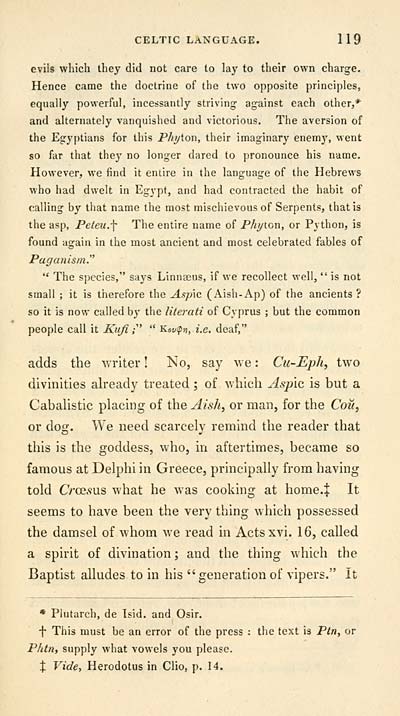Download files
Complete book:
Individual page:
Thumbnail gallery: Grid view | List view

CELTIC LANGUAGE. 119
evils which they did not care to lay to their own charge.
Hence came the doctrine of the two opposite principles,
equally powerful, incessantly striving against each other,*
and alternately vanquished and victorious. The aversion of
the Egyptians for this Phyion, their imaginary enemj', went
so far that they no longer dared to pronounce his name.
However, we find it entire in the language of the Hebrews
who had dwelt in Egypt, and had contracted the habit of
calling by that name the most mischievous of Serpents, that is
the asp, Peteu.\ The entire name of Phyion, or Python, is
found again in the most ancient and most celebrated fables of
Paganism."
" The species," says Linnaeus, if we recollect well, " is not
small ; it is therefore the Aspic (Aish-Ap) of the ancients ?
so it is now called b}' the literati of Cyprus ; but the common
people call it Kiifi ;" " Koi/(p», i.e. deaf,"
adds the writer ! No, say we : Cu-Eph, two
divinities already treated ; of which Aspic is but a
Cabahstic placing of the Aish^ or man, for the Cou,
or dog. We need scarcely remind the reader that
this is the goddess, who, in aftertimes, became so
famous at Delphi in Greece, principally from having
told O-oe.sus what he was cooking at home.:}: It
seems to have been the very thing which possessed
the damsel of whom we read in Acts xvi. 16, called
a spirit of divination ; and the thing which the
Baptist alludes to in his " generation of vipers." It
* Plutarch, de Isid. and Osir.
-{- This must be an error of the press : the text is Ptn, or
Phtn, supply what vowels you please.
X Vide, Herodotus in Clio, p. 14.
evils which they did not care to lay to their own charge.
Hence came the doctrine of the two opposite principles,
equally powerful, incessantly striving against each other,*
and alternately vanquished and victorious. The aversion of
the Egyptians for this Phyion, their imaginary enemj', went
so far that they no longer dared to pronounce his name.
However, we find it entire in the language of the Hebrews
who had dwelt in Egypt, and had contracted the habit of
calling by that name the most mischievous of Serpents, that is
the asp, Peteu.\ The entire name of Phyion, or Python, is
found again in the most ancient and most celebrated fables of
Paganism."
" The species," says Linnaeus, if we recollect well, " is not
small ; it is therefore the Aspic (Aish-Ap) of the ancients ?
so it is now called b}' the literati of Cyprus ; but the common
people call it Kiifi ;" " Koi/(p», i.e. deaf,"
adds the writer ! No, say we : Cu-Eph, two
divinities already treated ; of which Aspic is but a
Cabahstic placing of the Aish^ or man, for the Cou,
or dog. We need scarcely remind the reader that
this is the goddess, who, in aftertimes, became so
famous at Delphi in Greece, principally from having
told O-oe.sus what he was cooking at home.:}: It
seems to have been the very thing which possessed
the damsel of whom we read in Acts xvi. 16, called
a spirit of divination ; and the thing which the
Baptist alludes to in his " generation of vipers." It
* Plutarch, de Isid. and Osir.
-{- This must be an error of the press : the text is Ptn, or
Phtn, supply what vowels you please.
X Vide, Herodotus in Clio, p. 14.
Set display mode to: Large image | Transcription
Images and transcriptions on this page, including medium image downloads, may be used under the Creative Commons Attribution 4.0 International Licence unless otherwise stated. ![]()
| Early Gaelic Book Collections > Blair Collection > History of the Celtic language > (125) |
|---|
| Permanent URL | https://digital.nls.uk/76179984 |
|---|
| Description | A selection of books from a collection of more than 500 titles, mostly on religious and literary topics. Also includes some material dealing with other Celtic languages and societies. Collection created towards the end of the 19th century by Lady Evelyn Stewart Murray. |
|---|
| Description | Selected items from five 'Special and Named Printed Collections'. Includes books in Gaelic and other Celtic languages, works about the Gaels, their languages, literature, culture and history. |
|---|

